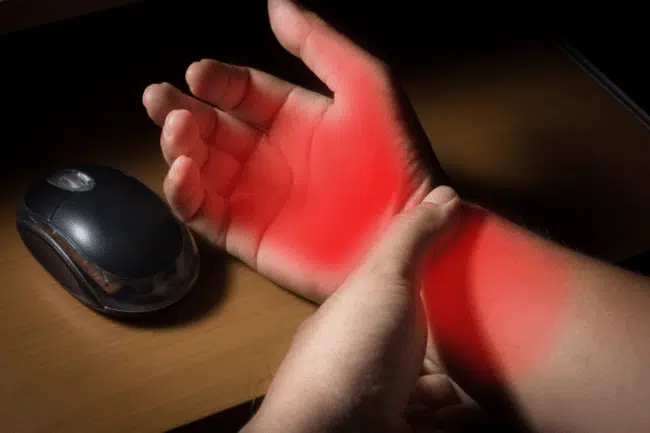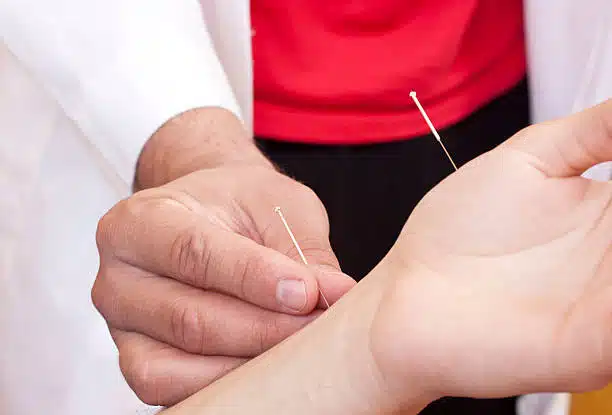5 Effective Non-Surgical Treatments for Carpal Tunnel Syndrome

Are you looking for non-surgical treatments for carpal tunnel syndrome? Carpal tunnel syndrome is a repetitive motion injury of the wrist. It occurs when the median nerve in the wrist becomes compressed or squeezed as it goes through the carpal tunnel, which is a narrow passageway in the wrist. Individuals with carpal tunnel often experience numbness, tingling, pain, and weakness in the hand and wrist. Since the traditional treatment for carpal tunnel often involves surgery with a long recovery time, most people would prefer to choose other methods to help alleviate their symptoms. Thankfully, there are a few holistic treatment options that you can look into that don’t involve surgery or other types of invasive procedures.
Acupuncture
In a study on acupuncture for carpal tunnel syndrome at the School of Persian and Complementary Medicine at Mashhad University of Medical Sciences in Mashhad, Iran, it was found that individuals who received 12 sessions of acupuncture for 30 minutes a week over the course of 4 weeks saw an improvement in their carpal tunnel symptoms. However, additional research is needed.

Acupuncture involves inserting extremely thin needles into the skin at specific points on the body. According to traditional Chinese beliefs, acupuncture works by restoring the balance of energy flow, or Qi. Modern science has yet to fully understand the dynamics between the insertion of acupuncture needles and pain relief and healing. However, it is believed that the insertion of needles stimulates the release of natural painkillers in the body, including endorphins and enkephalins. Additionally, acupuncture may help to improve blood flow in the treated area while reducing inflammation and stimulating the body’s natural ability to heal itself.
When acupuncture is used as one of the nonsurgical treatments for carpal tunnel syndrome, needles are inserted into the wrist, forearm and hand at specific points. The needles are typically left in place for between 15 and 30 minutes. It’s important to note that multiple sessions may be needed to alleviate pain.
Chiropractic Care

The goal of chiropractic care for carpal tunnel syndrome is to alleviate the pressure on the median nerve. relieving nerve impingement helps reduce pain, numbness, and tingling while increasing the range of motion of the wrist. Treatment usually involves chiropractic manipulation of the forearm, wrist, and hand. Additionally, chiropractors may utilize other non-invasive treatment techniques, including massage, stretching, and electrical stimulation.
There have been several studies on the effectiveness of chiropractic care for carpal tunnel syndrome. One study involving a 42-year-old female found that chiropractic care was effective at alleviating symptoms. Another study tested chiropractic care against traditional medical interventions, like medication and splinting. The study found that comfort and finger sensation improved with chiropractic care, but overall efficacy seemed to be unaffected. Additional research is needed.
Physical Rehabilitation

Physical rehabilitation for carpal tunnel syndrome involves performing a combination of exercises and stretches that are specifically designed to help reduce pain and inflammation while improving joint mobility and strength.
In a study on the effectiveness of manual therapy versus surgery for carpal tunnel, it was found that manual therapy did improve symptoms at the 12-month mark after patients received the final treatment. In another randomized group trial comparing manual therapy versus surgery, it was found that manual therapy may be just as effective as surgery for treating carpal tunnel syndrome.
Herbal Remedies

Several herbal remedies have been used to treat carpal tunnel syndrome, including arnica, comfrey, turmeric, ginger, and willow bark. Arnica is commonly used in topical ointments and creams to help reduce inflammation and pain. Comfrey has been traditionally used to help alleviate pain and promote healing for people with carpal tunnel syndrome. Turmeric and ginger can be added to food or taken as a supplement to help treat carpal tunnel syndrome. Both of those herbs are known for their anti-inflammatory properties and ability to help alleviate pain. Willow bark is a lesser-known herb. It contains salicin, which works similarly to the active ingredient in aspirin.
A clinical overview of comfrey has shown it to be effective at treating muscle and joint pain.
Essential Oils

Essential oils are concentrated plant extracts. Most people are familiar with their use in aromatherapy or as a topical treatment when mixed with a carrier oil or lotion base. Extracts that have been used for the treatment of carpal tunnel syndrome include lavender, peppermint, eucalyptus, and frankincense. All of these essential oils are known for their anti-inflammatory and pain-relieving properties, and they can be used in oils and creams to help alleviate the symptoms of carpal tunnel. It’s important to note that pure essential oils must be combined in a carrier oil and then used topically. The concentration of essential oil to carrier oil should never be more than 3 percent when the intention is to use it topically.
In a study that compared the use of lavender oil to conventional carpal tunnel treatments, it was found that the individual who used the lavender oil had a significant improvement in pinch power. There were no significant improvements in any other metric between either group.
Non-Surgical Treatments for Carpal Tunnel Syndrome in the Woodlands
When it comes to treating the symptoms of carpal tunnel syndrome and improving hand function, it is possible to use alternative therapy, like acupuncture, chiropractic care, herbal therapies, essential oils, and physical rehabilitation. In fact, many of these treatments can be used in conjunction with each other to help alleviate the pain, tingling, and numbness caused by carpal tunnel syndrome.
At Core Health Spine and Rehabilitation, we offer non-surgical treatments for carpal tunnel syndrome that can help manage your carpal tunnel symptoms. To schedule an appointment with our carpal tunnel doctor in the Woodlands, give us a call at 281-364-2673.



